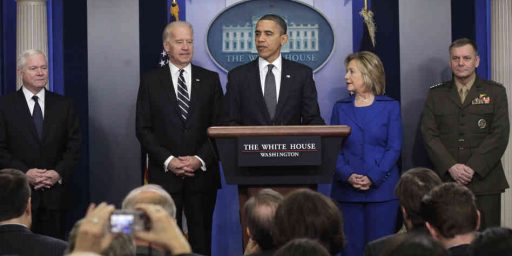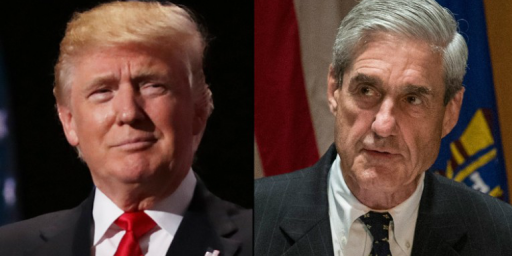Chart of the Day: Biggest Military Spenders
The US spends a lot on defense relative to, well, the rest of the world.
 Via the Economist‘s Democracy in America blog:
Via the Economist‘s Democracy in America blog:

Now the above information is not news to anyone who has been paying attention (although I’d wager that the graphical presentation is an eye-opener to some).
The chart suggests a variety of things off the top of my head:
1. I can’t help but think that we can afford to cut military spending without compromising national security. And, for that matter, remain the biggest spender in the world by several magnitudes.
2. No wonder SecDef Gates thinks that NATO states aren’t pulling their weight: they don’t really have to, now do they?
3. It is little wonder we find it so tempting to constantly get involved in more and more conflicts (with the latest temptation, apparently being Syria).






I kind of wonder to what extent Libya was a play to make NATO understand their underfunding.
What good is it having all these cool toys if you never get to play with them?
NATO members pledge 2% of GDP: Only five meet that and, as Dave Schuler points out, one of them is Albania.
That’s an excellent graphic. I’ve been aware of the spending comparison for awhile, but usually graphics take the form of pie charts or silly metaphoric representations (this many fighter jets compared to this many fighter jets).
Yeah, that’s a solid graph. I assume all, or most, of the people who read this blog were aware of how much we spend relative to the world. It’s nice to have the % of GDP included too, though.
In deference to keynesian principles, as much as I’d like to substantially reduce the military in size and scope I’d wait until after the current ecoomic problems had passed to do so.
Of course by then there’ll be no will to do so. And that’s why we’re where we are.
1. What does it cost to arm, clothe, house and pay a US soldier/sailor/airman/marine compared to say a Chinese soldier/sailor/airman/marine?
2. How many free riders are we carrying from WWII and the Cold War?
3. Who going to pick up those costs for #2 and the international humanitarian missions if the US doesn’t?
4. What will be the life cycle costs of allowing, if not encouraging, adventurism by the Chinese, Russians, Venezuelans, etc. if we stop or greatly cut back on our worldwide presence?
I think it has been noted before that waking up and suddenly discovering that you have the second best military can carry an enormous cost.
@Charles:
I always find it odd when someone like yourself (i.e., who often states rather loudly that we are broke or nearly broke) seems to totally balk at the notion defense might could be cut.
The space between the US and “second best military in the world” is so large that it makes the Grand Canyon look like a mere crack in the road. As such, the threat that we are going to just “wake up” one day and find ourselves compromised security-wise is highly, highly unlikely.
Great point! If we just outsourced our military to a developing nation/enterprise zone (perhaps through an independent contractor, imagine how much we’d save).
All sarcasm aside, this is a really good point, though it very much seems to tie into the popular conservative talking point of reducing to live within means. If the military is something that we cannot outsource, and that forces us not utilize typical “free-market” tools for driving down price, then the next question becomes, what is the “right size” force we should have to bring our spending back in line with the rest of the world.
OTB’s fifth columnist 😉
That graph makes it perfectly clear why Ryan’s Budget Plan doesn’t touch Defense spending. Well actually – no it doesn’t. I was being sarcastic. Ryan’s plan actually takes the $78B already proposed by Obama/Gates and calls it a day. It’s much easier to send 85 year olds searching for private insurance, with vouchers intentionally designed to decline in value, than to stand up to the Military-Industrial Complex. But I digress.
If Mr. Austin read the graph he would see we could cut defense spending in half and still not be number two – by far. I’m not suggesting we do that – just pointing out the ridiculousness of Mr. Austin’s statement.
What about this statistic?
The DoD will spend $53 billion next year on health care for its servicemembers and dependents (this does not include health care for retirees, nor those covered by the VA. That’s the same amount that Russia spends on its entire military and is more than what every other country in the world spends on their entire military with the exception of France, the UK, and China.
Of course, examining gross dollars spent is misleading because most countries are small. The US is both rich and big. I prefer to look at military spending per capita in which case the US is #2 and spends 2-3 times what most European countries do. I think if the US gave up its expeditionary capabilities then we would be spending somewhere close to where Europe is now.
It’s always nice when various straw, er, bogeymen are raised as the price of cutting the defense budget…yeah, that Hugo Chavez, he’s one scary fella…
“No wonder SecDef Gates thinks that NATO states aren’t pulling their weight: they don’t really have to, now do they?”
Perhaps it’s also a sign that NATO in its current form has outlived it’s usefulness with the collapse of the Soviet Union.
Financial commitment, or lack thereof, seems only to be the symptom of a deeper divide between the US and it’s NATO allies on the question of International Law and the War on Terror (http://jurist.org/forum/2011/06/gabor-rona-us-europe-schism.php).
If we want our allies to take more of the financial burden, we must also accept their views and their consequences.
@charles
Are you just being provacative here? I ask because less than a year ago, I thought you were advocating for total isolationism as our best answer for surviving the current economic crisis…
Dr. Taylor, I didn’t say not to cut defense. I think cuts to defense are inevitable, but whether its 5% or 25% will make a pretty big difference. I only tried to note that there are tradeoffs that have to be made with defense spending that are a little bit different than domestic spending that is focused on the redistribution of wealth. The kinds of pain that are always expressed anytime any domestic programs are threatened are going to happen if and when we cut defense as well, it’s just a question of who is going to bear the brunt of the pain.
mattb, yep. I did inded mention pulling back some time ago. Advocate might be stronger than the word I would use, but if we are going to cut defense spending it seems as though we should recognize the costs outside of the year to year expenditures. And no, I don’t know how to put a dollar figure on those potential costs.
An Interested Party, yep, Hugo Chavez is kind of scary when you look at what he tried to do in Honduras, what he is doing in Columbia, and his dalliances with Iran.
Actually, he is doing very little in Colombia.
He didn’t try anything in Honduras (yes, he was pals with Mel Zelaya, but that is a far cry from actually being directly involved).
And “dalliance” is about right–it is hardly a threat to US national security.
Indeed, the last time that a LatAm country presented a serious national security threat to the US was the Cuban Missile Crisis and that was really more the Soviets than the Cubans.
Venezuela simply does not represent a security risk of any consequence to the US.
Actually, China DID wake up and discover that they had a #2 military, and it doesn’t seem to have bothered them one bit.
Really, does anyone even make the attempt to claim that our 700 B of military spending is to actually DEFEND our nation?
Are we defending ourselves from the Yemeni threat? Is Libya poised to overrun us?
More seriously, compare our expenditures with China- they spend much less, both in real terms and % of GDP and yet they have somehow managed to rival us on nearly very orner of the globe in terms of political power.
How do they manage to get so much bang for the buck, and can we do the same?
How much of this is to defend our shores, versus impose our will upon the world?
Since the UK and France were the biggest advocates, it would be an interesting bit of jiu jitsu. Not to mention Italy, the country most likely to benefit from a new government in Tripoli, playing the role of Tom Sawyer.
Steven,
When you wake up one day and a venezuelian shock trooper has a machete at your throat, don’t go crying to Charles.
There is no doubt we could make large cuts and still be safe. The problem is that it would require a lot decisions and changes no one wants to make.
Things like: What do we want the military to do in the world? Do we need 4 air forces, 2 navies, 2 land forces, etc? Can we go to a largely reserve army like Israel has? Can we stop the congressional-contractor-retired officer complex that prevents wasteful programs from being canceled and the useful ones starved at birth?
It coat us a million dollars a year for each troop we have in Afghanistan, and we still have 50, 000 soldiers in Iraq, We could start cutting costs there.
Dr, Taylor, FARC says hello.
As for Iran, I guess we’ll know better in a couple months when Iran starts producing nuclear weapons. No wait, that can’t be right, Alex Knapp assured me that Iran was at least ten years away from being able to do that, as did Mohammed ElBaradei as head of the IAEA.
anjin-san, such biting wit.
@Charles,
The FARC are not a creation of Venezuela (and yes, I am aware of various allegations, and realities, in regards to Ven-FARC interactions). Really, of the things that I am willing to go the mattresses over, it is Colombian politics. Seriously. I literally wrote the book (or, at least, a book) on the subject (two if you count my dissertation).
And I fully expect Iran to acquire a nuclear weapon at some point in the relatively near future, and I have thought that for years (and have written such on multiple occasions), What that has to do with Hugo Chavez’ flirtations with Iran is a whole other topic.
Dr. Taylor, I’m certainly not going to argue that I know more about Columbia than you. Yes, FARC existed long before Chavez came along, but it seems Chavez is happy to use them to help destabilize Columbia. As to why that is, I’ll defer to your more informed judgment.
I’m still concerned that somebody is going to set off a nuclear weapon somewhere in the world in the not too distant future. It won’t matter where that much to be honest. Chavez mnay be just desperate enough in a couple of years to act like Castro supposedly did in the Cuban Missile Crisis when he reportedly wanted to launch them at the US, but the Soviets were smart enough not to. Perhaps I’m wrong to take people like Chavez at their word.
Two very quick responses:
1) The thing is, any argument that Chavez is using the FARC to destabilize Colombia is a massive exaggeration for a variety of reasons. Although I am aware that some float the idea.
2) The thing about the potential for a single nuclear attack, there is nothing that we can do to prevent such an outcome via military spending.
Dr. Taylor, as to #2, I disagree. Of course, it isn’t conventional forces I’m thinking about. Do expenditures on intel count as a military expenditure?
Some intel would be in that budget and some wouldn’t.
And intel becomes a different issue.
The basic point, however, is this: having a massively powerful military is not going to deter nuclear weapons development. If it did, then NK would not have a nuke.
Having worked in that world for many years, I’ll note that intel becomes less and less distinct from the military with each passing year and many things are now considered to be in the realm of intel that weren’t thirty years ago. The drawdown in numbers has heightened the need for intel to be delivered better and faster, though not necessarly cheaper.
As to a massive military not detering nuclear weapons development, again I’ll have to disagree. I think it went a long way in discouraging or inhibiting Libya and Iraq from pursuing nuclear weapons (including the Israeli raid on Osirak in 1981). The fact that it did not deter Pakistan, North Korea, or Iran is much more complicated and not merely a boolean equation determined by whether or not we have a large military capable of supporting a worldwide theater of operations. I would think that this is evidence that a big military is a necessary condition but perhaps not a sufficient condition to stop nuclear poliferation.